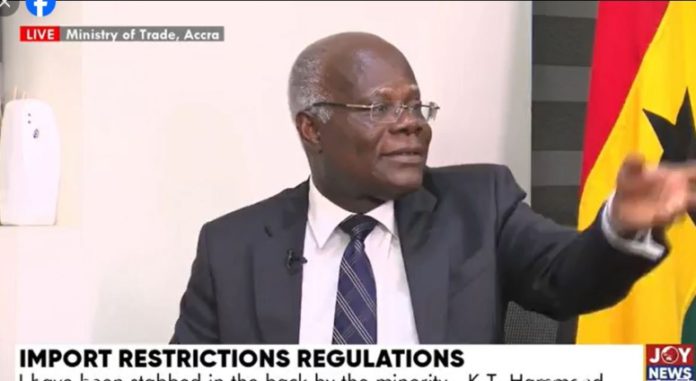The Minister of Trade and Industry, Kobina Tahir Hammond has downplayed suggestions that the strategic products legislative instrument (L.I) will induce corruption at the Ministry.
The Ministry hopes the regulation will help the cedi appreciate as well as help grow local industries.
Per the proposed regulation, any person seeking to import the selected products will require permission from the Trade Minister.
But the Minority in P arliament has described the regulation as a bad policy that must be withdrawn immediately.
It says the World Trade Organisation (WTO) frowns on such a policy because it violates its practices. It also says restricting importation will fuel inflation and worsen hardship as there are no ready substitutes. It also expressed worry that traders might not get the license to import products if they do not have ties with the New Patriotic Party when that power is granted the Minister.
But the Trade Minister says he sees no link between granting permission to individuals to import certain products and corruption.
In an interview on JoyNews, he said, “that mentality that it is going to lay in the pocket of whoever, how is it going to line itself up? You are afraid that I won’t give you because you are Evan Mensah? On the flip side, you are afraid that what? Why do I get corrupted by giving you the license or by not giving you the license?.”
He explained that, anyone who feels they mistreated has room to seek redress from the courts.
Mr Hammond also explained a clause in the L.I which mandates that the particulars of the principal officers, directors, and partners of the company requiring a license to import must be known.
He explained that this clause was important because the government was trying to make sure that Ghanaians were on the hierarchy of top importers.
Mr Hammond, who doubles as the Adansi Asokwa legislator justified his claim with the assertion “We don’t want to deal with faceless people, we want to deal with real human beings.”
The legislator added that the strategic product L.I was birthed from various consultations with several stakeholders.
“Stakeholders invited to various consultations included the Ghana Revenue Authority (GRA), Ghana Immigration Service, our own representative, Food and Drugs Authority, Standards Authority, Ministry of Food and Agriculture, Ghana Union of Traders, Association of Ghana Industries, Importers and Exporters Association of Ghana, Rice Farmers and Producers, Poultry Farmers and Association, Institute of Statistical Social and Economic Research and then Private Sector Stakeholders,” he told Evans Mensah on Monday.
The Minister continued that after the engagement stakeholders recommended that the L.I be expanded to cover more items including diapers, pipes, steel, electrical cables, and conductors.
Already, the minority in parliament has taken a firm decision to oppose the L.I., and has vowed to resist it.
Six business associations have also submitted a petition to parliament urging the house to reject the import restrictions bill. The Joint Business Consultative Forum, comprising associations such as the Ghana Union of Traders Associations (GUTA), Food and Beverages Association of Ghana (FABAG), Importers and Exporters Association of Ghana, Ghana Institute of Freight Forwarders (GIFF), Chamber of Automobile Dealership Ghana (CADEG), and Ghana National Chamber of Commerce and Industry (GNCCI), argue that the bill if enacted, would have detrimental effects on their businesses.
The petition, dated Sunday, November 26, outlined concerns that the legislation could negatively impact the prices of goods, disrupt the free flow of goods, and potentially harm businesses.
ALSO READ:

